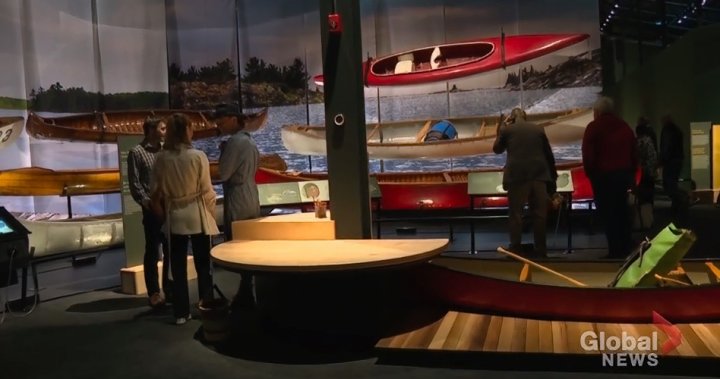The Canadian Canoe Museum in Peterborough, Ont., recently opened its new location on Ashburnham Drive after relocating from its former building on Monaghan Road. The new museum boasts a record collection of over 600 watercraft, 500 paddles, and hundreds of other artifacts inside a spacious 65,000-square-foot building. Outside, the museum features canoe and kayak launches onto Little Lake, two docks, and an area for outdoor education. The executive director of the museum, Carolyn Hyslop, expressed her excitement about the new facility, which was made possible through a $45-million project funded by donors and all levels of government.
Construction of the new museum began in October 2021, but faced obstacles due to the COVID-19 pandemic causing delays in construction industry supply chains and impacting labor availability. During the opening ceremony, Peterborough Mayor Jeff Leal emphasized the city’s historical connection to canoeing, particularly mentioning the iconic Peterborough Canoe Company. He highlighted the collaborative effort of supporters across Canada in making the museum’s relocation a reality. The museum aims to preserve and share stories of Indigenous peoples, early settlers, and modern-day adventurers, serving as a cultural hub and source of inspiration for visitors.
Canadian Prime Minister Justin Trudeau congratulated the museum on its reopening, sharing personal memories of canoeing with his father, former prime minister Pierre Elliott Trudeau. The museum now houses the birchbark canoe used by Trudeau and his father, representing Canada’s Indigenous heritage and culture. The Prime Minister praised the museum for its role in connecting people with nature and history. The museum was recently recognized by National Geographic as one of the 20 best cultural spots in the world in its “Best of the World 2024” guide.
Ontario Premier Doug Ford also extended his congratulations to the museum, reminiscing about his family friend Kirk Wipper, who helped found the museum and had a passion for canoes. Ford emphasized the importance of canoes in Ontario and Canada’s history and envisioned the museum as a source of inspiration and knowledge for all visitors. The Lt.-Gov. of Ontario, Edith Dumont, acknowledged the significant effort that went into relocating the museum and praised the new facility for its stunning design. She emphasized the cultural and historical significance of the canoe, particularly in the context of Indigenous peoples who invented and continue to guide its evolution.
Chief Keith Knott of Curve Lake First Nation and Margaret Froh, Métis Nation of Ontario president, both highlighted the canoe as a symbol of Canada’s history that must be preserved and shared with future generations. Knott emphasized the importance of learning about the canoes and the history they represent, while Froh underscored the role of the museum in storytelling and reconciliation with First Nations. The museum offers admission for adults, seniors, youth, and free entry for children under five, with operating hours from Monday to Sunday from 10 a.m. to 5 p.m. with extended hours on Thursdays. Tours, workshops, and summer paddle camps will also be available for visitors to enjoy.


